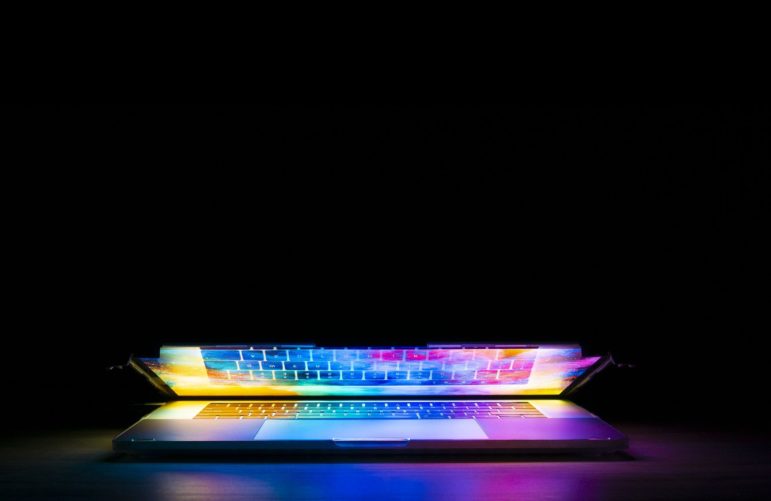ANAHEIM, Calif. – Although the internet has been around for decades now, many are calling 2020 the “Year of the Internet” as the entire country has moved huge portions of our lives online.

Image credit: Joshua Woroniecki from Pixabay
While encountering a large and diverse Pagan community online is certainly nothing new, COVID-19 restrictions and concerns have forced even local covens, groups, and meetups to find alternative ways to share rituals.
Rituals and gatherings via Zoom or Google Hangouts is a far cry from the Ning chatrooms that flourished in the early 2000s, but some of the same accessibility issues remain.
For differently-abled Pagans who are navigating the expression of their practice through virtual meetings, this transition has been more involved than negotiating problematic internet connections and setting up backgrounds.
What has proven to be a frustrating and stressful transition for some has been a true game-changer for others.
Although the first rounds of vaccines have rolled out for some health-care workers, far too many places within the U.S. are still contending with the uncontrolled spread of the COVID-19 virus. Virtual meeting platforms are probably here to stay at least for the immediate future. How these platforms might facilitate accessibility and community during this unprecedented isolation remains to be seen.
For some challenges like hearing loss, a platform like Zoom can be invaluable. Lip-reading is impossible unless the speaker uses specifically-designed transparent masks.
“Now that everyone is wearing masks, I can’t hear people in person. You have no idea how much lipreading you do, even if you are not aware of it,” explains author and poet Denise Dumars, also known as Rev. Dee.
She explained that using Zoom for rituals has been a mostly positive experience for her group, Lyceum of Auset Hauhet. Since the volume is adjustable, she can hear even the softest speakers, as well as watch their faces and lips move.
Accessibility in design is not just a concept for architecture. Software developers must approach a product with accessibility in mind from the very beginning. Some providers appear to have managed their inclusion resources better than others.
One drawback for Denise Dumars with Zoom has been music quality.
Another difficulty for users is that all features are not equally good or bad across all platforms. While Dumars has found Facebook event quality to be inconsistent, others have moved to Facebook Messenger with more positive results.
Disabilities can also be visible and invisible. For those who live with chronic illnesses like Lupus, Ehlers-Danlos, Fibromyalgia, and arthritis, moving ritual and magical work online to these interactive platforms has been a boon.
Maghen The Hood Witch—on Facebook and on Instagram —has largely moved her readings to Facebook Messenger. She suffers from several chronic autoimmune disorders, so in-person tarot and chart readings are not only dangerous because of potential COVID-19 exposure, they’re just not possible on high pain days.
By working with clients via Messenger, Maghen The Hood Witch can reach people anywhere in the country.
She likes that they can then retain a “record” of the reading for future reference. Clients can meet with her in real-time, or they can provide their information and receive their reading at a later time, as well as ask follow-up questions. For her, flexibility is key and allows her to not only accommodate her own needs, but also those of her clients.
Many folks who might normally have trouble getting to an in-person ritual because of mobility issues are now able to participate in rituals and meetings that have gone online. Those in motorized or non-motorized chairs don’t have to worry about trying to navigate paths, soft or uneven ground and high grass, or buildings not fitted with accommodations.
Products like Webex, Google Hangouts, FaceTime, Zoom, and others saw unprecedented usage in 2020 as a result of COVID-19 restrictions. Until infection rates drop significantly, most groups will probably continue to meet virtually for rituals and conferences. Because many of the platforms have offered greater accessibility for many, it’s very likely that many groups will continue to offer meetings virtually even after the pandemic is considered under control.
For Dumars, the approach going forward might be a hybrid. She often cannot attend outdoor rituals, and has found that teaching online, especially via YouTube, which provides subtitles, has been largely positive.
“Zoom has been a lifesaver for me. I’ve taught my college classes with Zoom, and it’s much easier to turn up the volume on it and hear perfectly. In the classroom, I can’t hear my students, but online I can!”
For her, teaching in classrooms has often been marked by physical difficulty and a lack of modifications. She often carries a letter from her doctor for administrators when a teaching space is not ADA compliant.
Pagans of all abilities who were accustomed to meeting in person in covens, at blots, and for various rituals have bemoaned the separation that happens when a meeting is moved online. For many practitioners, it has meant a lack of connection with the earth and with fellow participants, and despite the technological advances are looking forward to when it will be safer to gather in person.
For those who have different challenges, virtual events have created some effective solutions. As in-person gatherings return after COVID-19, accessibility issues may remain but with new insights and possibly new solutions, molded by our collective virtual experiences.
The Wild Hunt is not responsible for links to external content.
To join a conversation on this post:
Visit our The Wild Hunt subreddit! Point your favorite browser to https://www.reddit.com/r/The_Wild_Hunt_News/, then click “JOIN”. Make sure to click the bell, too, to be notified of new articles posted to our subreddit.
